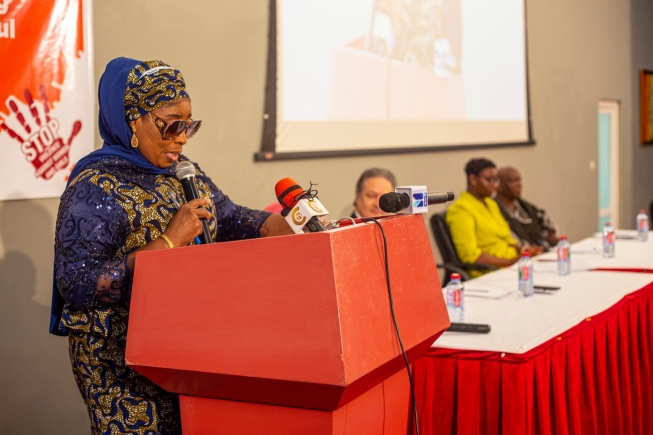
Gender Minister urges women, girls to speak up on gender-based violence
The Minister of Gender, Children and Social Protection, Lariba Zuweira Abudu, has urged women and girls, especially survivors of Gender-Based Violence (GBV), to report cases for the right actions to be taken.
She was of the view that violence against women and girls was a deliberate violation of their rights which impeded their progress, therefore the victims needed to report the cases for their own rights to be protected.
The minister was speaking on Wednesday at an event dubbed “High-Level Dialogue on Combating Sexual and Gender-Based Violence and Harmful Cultural Practices in Ghana” in Accra.
Event
The event formed part of the ministry’s 16 Days of Activism Against GBV meant to create awareness and dialogue on ways to combat the menace.
It was held in partnership with the United Nations in Ghana, Oxfam, GIZ, Embassy of Spain in Ghana and Amnesty International.
Need to speak up
“Daily, we hear and read about these abuses, however, only a few come to light through reporting to the appropriate quarters either because they do not know where to go and what services are available for them,” Ms Abudu said.
“Most survivors often ask the question: What will I benefit if I report my case? This reflects the poor state of our support system services to survivors,” she said.

She noted that Ghana had made strides in fighting violence against women and girls over the years, including the establishment of the DOVVSU, passage of the Domestic Violence Act, 732 (2007), establishment of the Domestic Violence Secretariat at the ministry, among others.
However, she said there were still gaps in the nation’s quest to respond adequately to violence against women and girls such as lack of shelters, inadequate funds to enable the ministry to prevent, rehabilitate and reintegrate victims/survivors, limited number of hotlines or helplines, lack of treatment centers for survivors, the weak implementation of laws, lack of credible and reliable data to inform evidence- based interventions and above all, inadequate professional staff to provide quality services to survivors.
“This is worrying. It is for these reasons that the ministry realised the need to hold this dialogue to call on all stakeholders to invest in the work of the ministry to enable particularly the Domestic Violence Secretariat to live up to its mandate,” she said.
Slow progress
The Spanish Ambassador to Ghana, Jose Xavier Guitterez, also lamented the slow progress towards a more egalitarian society and the increasing threat to women’s sexual and reproductive freedom.
He said the dire situation of women and girls in Afghanistan, for instance, showed that much needed to be done when it came to GBV.
Instituting measures
For her part, the Representative of the United Nations Resident Coordinator, Fati Ndiaye, said her outfit was honoured to have partnered with the MoGCSP to organise the dialogue which sought to institute measures to coordinate effective response services to survivors of GBV and other harmful practices in the country.
She also called for continuous investment in the allocation of resources to programmes that addressed the root causes of GBV in order to build a generation and foster an environment that viewed violence as an intolerable breach of human rights.

“At the UN, we work in partnership with the government and the people of Ghana for sustainable social development, peace and human rights. Central to this mission is the strategic partnerships we foster from the national through to the community level with key stakeholders like yourselves to advance gender equality and end harmful practices, especially those that affect women and girls,” she said.
She mentioned that GBV constituted one of the most prevalent human rights violations in the world and it knew no social, economic or national boundaries because it undermined the health, dignity, security and autonomy of its victims.
“Gender-Based Violence remains shrouded in culture of silence. It is rooted in a complex set of patriarchal beliefs, power and control that continue to create a social environment in which it is pervasive and normalized,” she said.
She also called for continuous investment in and allocation of resources to programmes that addressed the root causes of GBV in order to build a generation and foster an environment that viewed violence as an intolerable breach of human rights.



